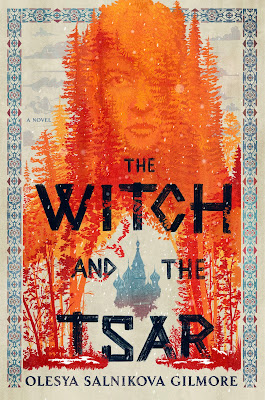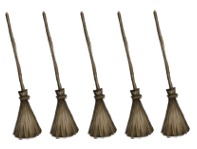The Witch and the Tsar
Author: Olesya Salnikova Gilmore
Release Date: September 20, 2022
Publisher: Ace HardcoverIn
this stunning historical fantasy debut, an isolated witch will risk all
that she has to save her country and her people from dangerous gods and
the twisted hearts of men.
As
a half goddess possessing magic, Yaga is used to living on her own, her
prior entanglements with mortals having led to heartbreak. She mostly
keeps to her hut in the woods, where those in need of healing seek her
out, even as they spread rumors about her supposed cruelty and wicked
spells. But when her old friend Anastasia—now the wife of the tsar, and
suffering from a mysterious illness—arrives in her forest desperate for
her protection, Yaga realizes the fate of all of Russia is tied to
Anastasia’s. Yaga must step out of the shadows to protect the land she
loves.
As she travels to
Moscow, Yaga witnesses a sixteenth-century Russia on the brink of chaos.
Tsar Ivan—soon to become Ivan the Terrible—grows more volatile and
tyrannical by the day, and Yaga believes the tsaritsa is being poisoned
by an unknown enemy. But what Yaga cannot know is that Ivan is being
manipulated by powers far older and more fearsome than anyone can
imagine.

Leaving the guard to keep watch outside, I ushered the tsaritsa into
the darkened innards of my hut. Little Hen was used to clients coming
and going and usually behaved herself enough by staying low to the
ground so as not to frighten anyone. I hastily lit a few stubby beeswax
candles. The scent of burning honey filled the air as I turned back to
my royal visitor, swallowing hard.
Her tears had dried, her dull brown
eyes taking on a chillingly distant look. Where were the flecks of gold,
the quick wit, the uncharacteristic warmth of someone of her social
standing? Her vibrancy was gone. Her skirts rustled like dried-up leaves
as she sank onto the stool I offered her with the tired, defeated air
of one who wishes never to rise again.
A few wandering chickens clucked
at my feet. Noch hooted from a shadowy corner. The tsaritsa probably
found this-me-uncivilized, disgustingly rustic, even.
But she only
said, "It has been months. The doctors do not know what it is. I do."
She struggled out of her cloak. "I am dying."
The bell-sleeved,
flower-patterned letnik gown dragged her down as if bloated with
seawater. A little shiver darted up my spine, almost prompting me to ask
the tsaritsa how many dresses she wore. For wealthy women, it was
customarily a minimum of three. But it was clear it was not the dresses
plaguing her.
There was sweat on her brow, a redness at her mouth and
eyes, though her skin was missing the telltale blotches and swellings of
pestilence. An internal imbalance was possible, but those were the
hardest to heal. An illness of the mind or spirit? Stooping under the
dry herbs and flowers hanging from the slanted ceiling, I crossed the
room to an iron cauldron bubbling over a fire that never went out. Iron
possessed mystical and protective powers.
"It has been some time since
you visited me," I said slowly, brushing aside a purple lavender
blossom. "Thirteen years?"
"With the wedding, I..."
"I have heard
weddings eat into time like moths. What about after? I tended to your
family for years. To be forgotten so quickly by you and your mother was
quite the revelation." I bent over the cauldron and ladled out hot water
into a bowl fashioned from bone. Steam billowed into my face as I
flushed with resentment. Or maybe disappointment.
How would the great
Earth Goddess Mokosh feel about such neglect? I thought about my beloved
mother, the protector of women-of their work and destiny, the birth of
their children. I glanced up at her symbol, the wooden horse's head
hanging above the cauldron.
We provide succor regardless of wounded
pride, she had once told me. Pride is an illusion and the path to
conceit. Gods may be guilty of it, Yaga, but not you.
But our gods, the
ancient ones born of the Universe, had been worshipped then. While
Mokosh had not spoken of it, tales say she helped to create the Earth
with Perun, the Supreme God and Lord of the Heavens, and many other gods
besides. Perun forged the sky with his thunderbolts; Mokosh gave birth
to the land. Her spindle spun the cloth of humanity, thread by thread,
woman by woman, life to death, generation after generation. She was
Moist Earth, mother of all living things and my actual mother.
Eventually, mortals began to worship the Christian god. While some
believed in the old gods as well as him, I doubted the tsaritsa was of
their number, living as she did in the center of the Orthodox Christian
faith in Russia. Yet before her ascent to the court, she had gladly
partaken of what infuriatingly limited talents I had inherited from
Mokosh.
"I made you a tsaritsa," I said. "I provided your mother with
the herbs and charms that got the court to take notice of a dead
aristocrat's daughter. Or have you forgotten?"
Excerpted
from The Witch and the Tsar by Olesya Salnikova Gilmore Copyright ©
2022 by Olesya Salnikova Gilmore. Excerpted by permission of Ace. All
rights reserved. No part of this excerpt may be reproduced or reprinted
without permission in writing from the publisher.
Olesya Salnikova Gilmore
was born in Moscow, Russia, raised in the U.S., and graduated from
Pepperdine University with a BA in English/political science, and from
Northwestern School of Law with a JD. She practiced litigation at a
large law firm for several years before pursuing her dream of becoming
an author. She is most happy writing historical fiction and fantasy
inspired by Eastern European folklore. She lives in a wooded, lakeside
suburb of Chicago with her husband and daughter. The Witch and the Tsar is her debut novel. Learn more online at www.olesyagilmore.com.































